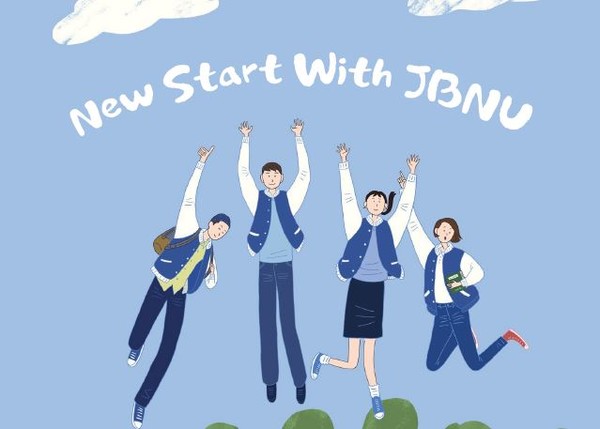
Welcome to JBNU! JBNU Jeonju Campus consists of sixteen colleges and various other buildings for students. There are a plethora of other spaces than the lecture rooms. It is important to know the approximate location of each building when taking classes. Let’s find out the various places at JBNU and learn some tips and tricks about JBNU!
- Everywhere on Jeonju Campus
The JBNU Globe introduces the buildings on the JBNU Jeonju Campus.
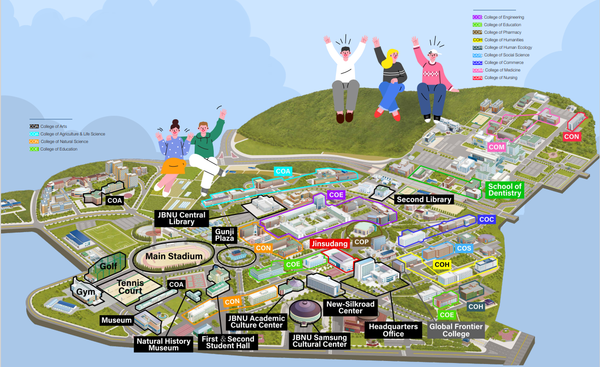
- JBNU Here and There
The JBNU Globe will now introduce the various spots at JBNU.
-Places to enjoy beautiful scenery and performances
1. Gunji Plaza
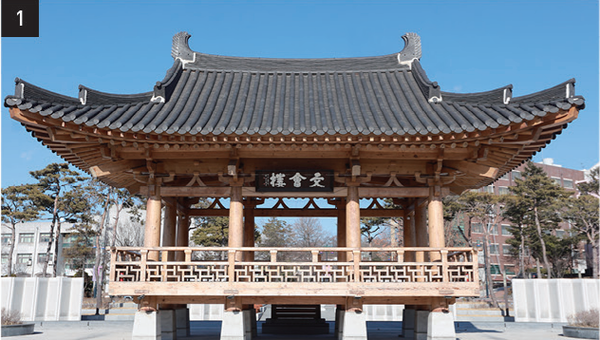
Gunji Plaza translates to ‘where the sky stays’. The traditional pavilion, Munhoeru[문회루], is located in the center of Gunji Plaza. This pavilion carries the meaning of ‘a place where culture, literature, and learning come together’. You can look upon the big fountain and the scenery of Munhoeru while sitting on a chair. At night, the lights on Munhoeru gives us a sense of its majesty. At times, you can see busking and various club performances here.
2. JBNU Samsung Cultural Center
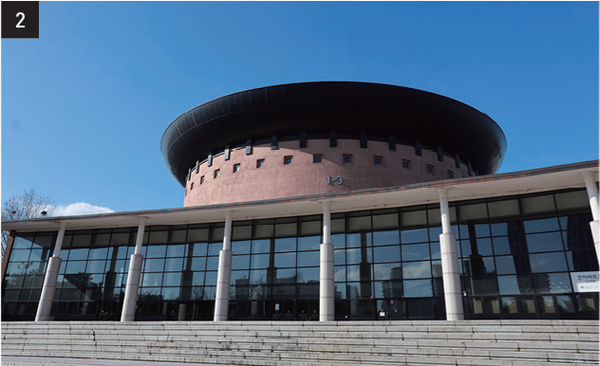
When you come through the JBNU new gate, the JBNU Samsung Cultural Center is on your left. It is a performance facility where you can see concerts, plays, and musicals. It consists of a two-story large concert hall, the Gunji art hall (small concert hall), and an exhibition hall. Last year, many people went to see the 2022 New Year's Eve concert. On theJBNU Cultural Center website, you can find the schedule of performances and exhibitions.
3. JBNU Academic Culture Center
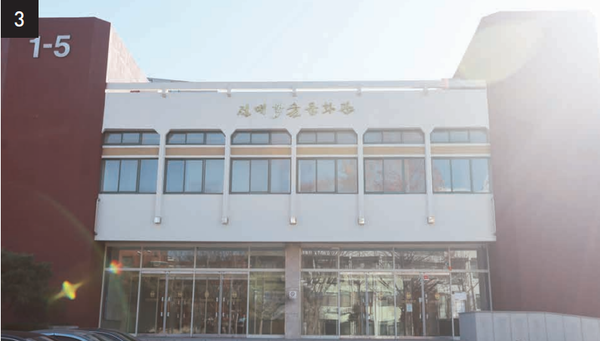
Just around the corner from the New-Silkroad Center, there is the JBNU Academic Culture Center. Here, you can take liberal arts classes or attend other school or outside events. Last year, a policy forum for the Student Council candidates, employment seminars, and author-invited book concerts were held here.
4. Main Stadium
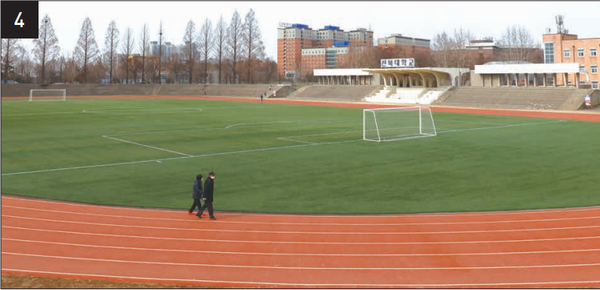
Next to Gunji Plaza, there is a circular main stadium. Around the main stadium, there are stairs to sit on and rocking chairs (The rocking chairs are crowded, especially in the afternoon and evening, so if you want to use it, you have to get a spot early!). The Daedong Festival stage and sports competitions for each college are held here. On a usual day, anyone can exercise and play freely here. Many people gather here to hang out and enjoy the beautiful scenery. The evening is especially pleasant, as you can see the beautiful sunset.
-Places to study and convenient facilities for students
1. JBNU Headquarters Office
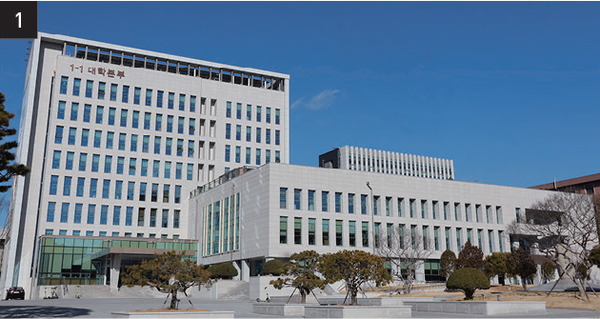
The JBNU Headquarters Office is essential for running the school. It is in front of the New-SilkRoad Center. There are major departments here that manage the overall administration of JBNU. It also supports various administrative services for JBNU students. If you have any questions about school administration, you can get help from the relevant department here.
2. New-Silkroad Center
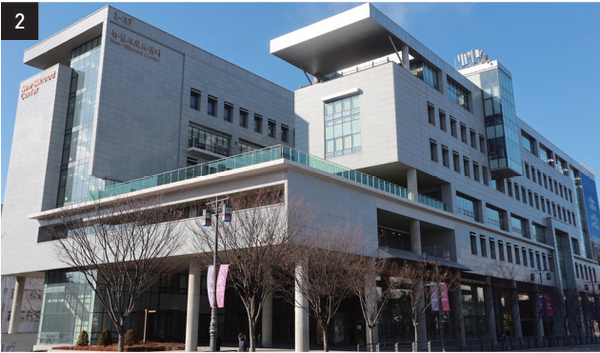
When you enter through the JBNU new gate, the large building on the left is the New-Silkroad Center. There is a study area on the first floor. The Office of Admission is on the second floor. On the third to the sixth floors, there are classrooms where you can take foreign languages and practical English classes. Students of JBNU can take various classes which are organized by the JBNU Language Education Center. Japanese, Chinese, Spanish, German, and Vietnamese conversation classes are available. Of course, you can take TOEIC and English conversation classes as well. For international students, there is a Korean language course that teaches Korean grammar and speaking. If you want more information about this, search ‘JBNU Language Education Center’ online. In addition, on the third floor, there is an Office of International Cooperation, which is in charge of JBNU internalization. They handle exchange student affairs and conduct language training programs.
3. JBNU Central Library
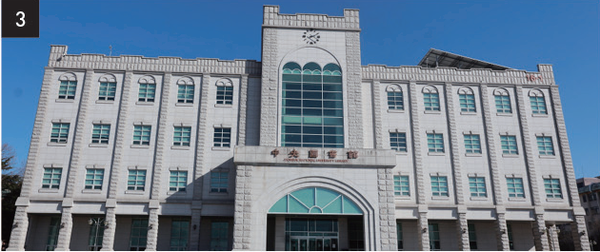
The JBNU Central Library, which has a beautiful façade, is located between the College of Agriculture & Life Sciences Building No.2 and the College of Engineering Building No.4. The first floor has a multimedia center where you can use your laptop, and there is a booth to watch movies beside a multimedia center. Next to the movie booth, there is the Office of Career Support which helps JBNU students find a job. Convenience stores and cafes are also on the first floor. If you need to rest, feel free to check it out. On the second and third floors, you can read or borrow books and use the group study rooms. The fourth floor has reading rooms (including a laptop reading room) and a group study room. If you need a place to do a group project or study in a quiet atmosphere, it would be an excellent idea to visit the JBNU Central Library.
| You will need your student ID when you borrow books or use the reading rooms. The mobile student ID feature is also available on the JBNU library app. |
4. First and Second Student Halls
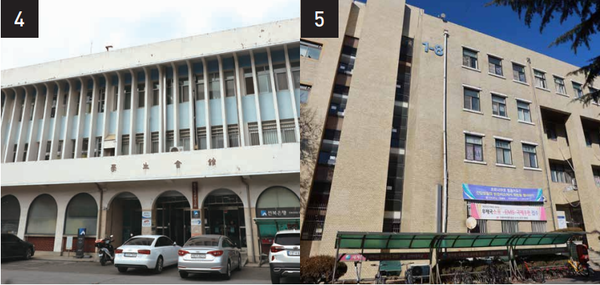
Student Halls are places of convenience for students. If you exit Gunji plaza toward the old main gate, there are two Student Halls. At the first Student Hall, there are convenient facilities such as a bank, a convenience store, a stationery store, and a bookstore. In addition, the JBNU press center and several club rooms are located there. The second Student Hall is next to the first Student Hall. You can use the post office on the first floor. Club rooms are located on the second and third floors. In addition, the Student Council room is on the second floor.
- Benefits and Welfare Systems for Students
Here are the benefits and welfare systems that JBNU students can get universally. Do not forget to contact the respective offices and centers listed below for specific information! Scanning the QR codes leads to the website of the office of the in each parentheses.
- Deduction of Medical Expenses for JBNU Students (Office of Student Affairs)
This policy was established to contribute to improving student welfare by paying appropriate medical expenses when JBNU students receive treatment at hospitals. Only those who have paid the medical union dues can be beneficiaries of this policy. It must be paid before the start of the semester and entitlement is granted from the start of the semester. The amount of financial support varies depending on the medical expenses and the severity of the injury. However, benefits are limited if the medical expense is less than 30,000 won or if it is against the health policy, such as cosmetic surgery.
2. Belt Program (Office of Career Support)
This is a program that supports career management according to the year so that students can grow their talents, professional knowledge, and virtues required by society. This is managed by the Office of Career Support. Students have to get a ‘white belt’ in their freshman year, a ‘yellow belt’ in their sophomore year, a ‘blue belt’ in their junior year, and a ‘red belt’ in their senior year. Some students, if they have acquired all these belts, are awarded a ‘black belt’, which means ‘core competency’. If students get a belt that matches their year, they can be awarded a scholarship. When acquiring a white belt, the tuition and other fees for the next semester are reduced. From the yellow belt level, a scholarship is paid in cash to students. Do not fret if you have not acquired the belt that matches your year. For example, students who are currently in their junior year can get white and yellow belts. However, the benefits corresponding to those two cannot be obtained. In order to acquire a belt, points must be accumulated through completing various activities and programs that JBNU has set as the standard. The higher your year, the more points are required for each belt.
3. HRC (Honors Residential College) (Institute for Education Innovation)
This is a unique system at JBNU that combines students’ learning and personal life in order to strengthen the educational competency of excelling students. Students selected for HRC can receive full financial support for dormitory fees. In their sophomore year, they will study abroad in a Southeast Asian country and learn international virtues and skills. These students can also receive career-related foreign language training. In their junior year, they can engage in more specialized activities according to their desired career path. Students who choose to work for a company after graduation have the opportunity to be prioritized as scholarship students of an excellent company and can receive appropriate scholarships. Students who choose to enter a higher educational institution can work in their advisor's laboratory and are exempted from tuition fees at JBNU's graduate school. Upon graduation, students receive a certificate confirming that they are excellent academics.
4. Language Proficiency Scholarship (Language Education Center, Office of International Affairs)
This is a system that exempts or reduces tuition fees when a student has acquired a language certificate of proficiency. JBNU recognizes TOEIC, TEPS, TOEFL, and IELTS test certificates. Depending on the test and score, the tuition fees that can be exempted or reduced varies. There is also a TOPIK scholarship targeting foreign students. Foreign students enrolled in undergraduate or graduate school can apply for this scholarship if they have a TOPIK level four or higher. The application period and amount of support may vary from year to year.
5. Start-Up Support for Students (Startup Education Center)
Did you know that JBNU has a Startup Education Center? It is committed to spreading a positive start-up culture on campus and nurturing creative young entrepreneurs. As part of that, it connects students with start-up organizations on and off campus, invites start-up experts to give speeches, and provides offices for JBNU students who run start-up companies. Students can create a start-up club and get help from the Startup Education Center in every process of expanding it into a functioning business.
6. Discount on Jeonbuk Hyundai Motors Match Tickets
This discount is for the win-win benefit of JBNU and Jeonbuk Hyundai Motors, a soccer club based in Jeollabuk-do and partnered with JBNU. When Jeonbuk Hyundai Motors plays a K-League match at their home stadium, JBNU faculty and students can get a discount on ticket prices. There is a 4,000 won discount for economy seats only, and a faculty or student ID must be needed when purchasing tickets on-site.
- Q&A for Freshman
The JBNU Globe has selected some questions from the freshman forum on ‘Everytime’ (a communication app for university students) and has received answers for the Globe’s post.
Q. What kind of school clubs are at JBNU?
A. There are clubs for each major, college clubs, and central clubs and the list is registered on JBNU Oasis. The types of clubs are based on religion, sports, performances, academic achievement, volunteer work, etc. If you need more information about each club, you can use Everytime, but how about making use of the club booths? The booths often run at the beginning of the semester near the old main gate. You can sign up for a club there. Each club has a different way to join and a period of application, so you should check the schedule of the club you are interested in. In the case of major clubs and college clubs that do not run the club promotion booth, you can get more detailed information from their Instagram posts or on Everytime. The club activities will be an opportunity to meet many different people. However, too many club activities will make you tired and busy and take too much of your time. Therefore, choosing only a few clubs that you are most interested in is wise.
Q. Is The JBNU Globe a club? How can I join?
A. The JBNU Globe belongs to the JBNU press center, which is not a club. You can apply according to the recruitment schedule. The recruitment schedule for The JBNU Globe is from March 6th to 22nd. If you want to apply, you will have an interview after the first document screening and will receive the final result. Anyone who is a freshman in 2023 can apply.
Q. How do I participate in extracurricular activities or contest exhibitions?
A. That can be found through the JBNU noticeboard on the JBNU website and on ‘Campuspick’. Campuspick is an app that shares information related to extracurricular activities and contest exhibitions. You can also check the announcements posted on your department’s group chatroom. Apply whenever a recruitment post that you are interested in is posted. Even if you are not selected, it will be a meaningful experience. Besides that, checking the noticeboard on the school website will help you receive up-to-date information.
Regarding the many activities and benefits listed above, if you have any inquiries or need help, please contact the relevant department or visit your department or view the apps mentioned above. How about taking a stroll on the beautiful campus and enjoy the various student benefits? The JBNU Globe is rooting for your fresh start!
| Lee Da-yeon, Ha Yae-one Editors, Yoon Ye-rim Reporter

